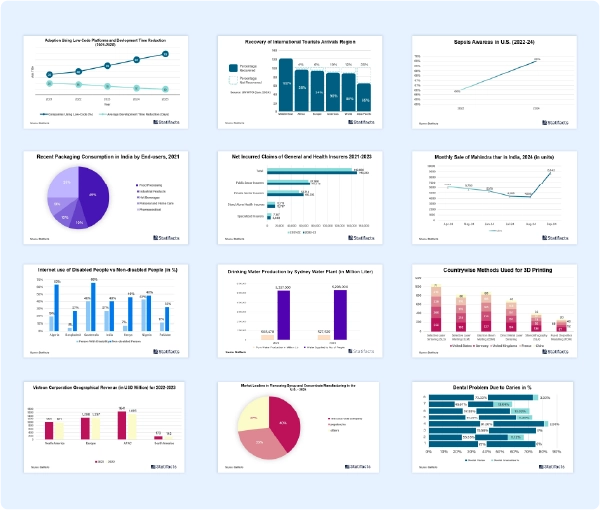The U.S. personalized medicine market size is worth around USD 345.56 billion in 2025 and is anticipated to reach around USD 705.88 billion by 2034, growing at a notable CAGR of 8.26% from 2024 to 2034.
U.S. Personalized Medicine Market Report Highlights
- By product, the personalized nutrition & wellness segment recorded a dominant revenue share of 52.57% in 2025.
- By product, the personalized medicine therapeutics products segment is projected to record the fastest CAGR during the forecast period.
- By end-use, the hospital segment led the U.S. personalized medicine market with a dominant revenue share in 2025.
- By end-use, the diagnostic center segment is expected to grow the fastest during the forecast period.
The U.S. personalized medicine market refers to the production, distribution, and application of these personalized medicines, an emerging practice of medicine that uses an individual’s genetic profile to guide decisions made regarding the prevention, diagnosis, and treatment of disease. Personalized medicines integrate the genetic profiles of individuals to guide diagnostic, preventive, and treatment decisions. Personalized medicine is advanced through the human genome project data. There are many benefits for personalized medicines, including enhancing diagnostic accuracy, identifying the best treatment option for a patient based on their characteristics, targeted therapy that reduces side effects, increases the likelihood of successful treatments, increases patient engagement, allows for better disease prevention, promotes research & innovation, and reduces healthcare costs.
The rising chronic diseases and cancer are fueling the demand for targeted and personalized treatments, driving the growth of the U.S. personalized medicine market. Personalized medicines for chronic diseases take a bottom-up approach to cell dysfunction that allows healthcare providers to prescribe the right treatment to a specific patient with precise doses catered to their specific genome, with the expectation of better health at a lower cost. A new data analytic workflow is currently being employed by researchers to generate patient similarity models that offer insights to create personalized treatment regimens by point-of-contact healthcare providers.
Research and development efforts by institutes such as the National Institutes of Health research and the boom in the biotechnology and pharmaceutical sectors are leading to advancements such as CRISPR-Cas9, the Human Genome Project, and the emergence of panomic analysis. This is driving the growth of the U.S. personalized medicine market. The revolutionary progress in developing NGS (next-generation sequencing) technologies has made it possible to deliver accurate genomic information in a timely manner. Next-generation sequencing technology has transformed clinical and biomedical research and found its application in personalized medicine.
NSG technology allows for the accurate and rapid sequencing of a number of genes at once. Advancement of personalized medicines involves the use of technologies to seriously acquire and assess an individual’s own data for only their own treatment. The revolution is only possible in the healthcare system when the equal contribution of consumers and patients in participating in clinical trials, innovators and entrepreneurs develop smart tools and analyze genetic information, and regulators educate consumers and providers and support important revolutions in policy and regulation.
A rise in demand for targeted solutions is driving the growth of the U.S. personalized medicine market. Targeted therapies and companion diagnostics are gaining traction for superior outcomes and minimized side effects. There are many benefits of personalized medicine, including minimizing the risk of drug toxicity. Personalized medicine, integrated into healthcare, has the potential to yield more precise diagnoses, predict disease risk before symptoms occur, and design customized plans that maximize efficiency and safety. Targeted solutions tool is designed to enhance patient safety by spreading solutions to persistent problems in healthcare. Targeted therapy refers to a type of medical treatment that focuses on specific characteristics of a disease to effectively target specific cells.
Artificial intelligence (AI) integration in personalized medicine has the potential to continuously learn and adapt. AI algorithms are used to analyze treatment outcomes and patient responses with the most probable outcomes, allowing for the optimization and refinement of treatment plans that drive the growth of the U.S. personalized medicine market. Precision medicine methods can identify the phenotype of patients with less common responses to treatment or unique healthcare needs. AI and machine learning leverage sophisticated computation and interference to generate insights, allowing the system to reason and for better clinician decision-making through augmented intelligence. Artificial intelligence-based personalization uses this rule-based analysis to pick out statistical information from customer data and make predictions for future customer behavior or preferences. AI can help clinicians get to a diagnosis more quickly and also find examples of treatments that have been effective in people with this condition by scanning large data sets to find similar cases.
Advancements in genomics and biotechnology are allowing accurate therapies and diagnostics, which are driving the growth of the U.S. personalized medicine market. The benefits of advancement in genomics and biotechnology include public health, innovation, and intellectual property rights. These advancements focus on more accurate and faster sequencing, improved data analysis, and reduced costs. The emerging fields of genomics and precision medicine have revolutionized cancer screening and therapy to enhance cancer outcomes. Modern biotechnology provides innovative products and technologies to combat debilitating and rare diseases, delivering more effective and personalized treatments based on genomic data.
Published by
Laxmi Narayan

